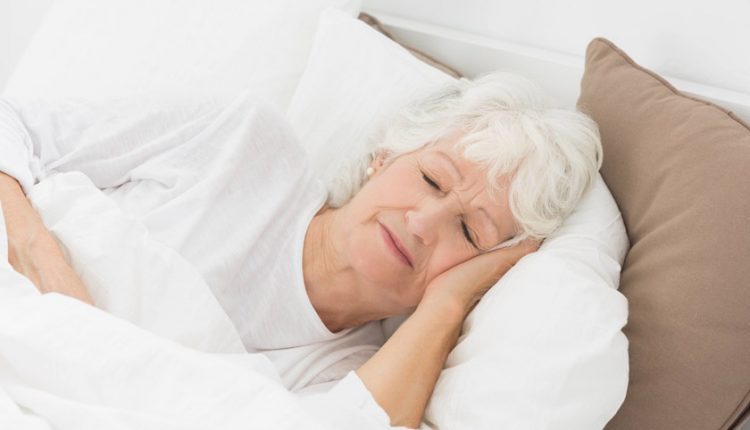
An Uninterrupted Sleep for Seniors Is Not a Dream Anymore!
Our bodies regulate sleep in a similar way to how we regulate eating, drinking, and breathing. Sleep plays a vital role in our health and well-being by improving our concentration and memory, repairing any cell damage we may have sustained during the day, and helping strengthen our immune system, thereby preventing disease.
Seniors’ sleep disturbances are associated with depression, attention and memory difficulties, excessive daytime sleepiness, and frequent falls at night.
Contents
How Much Sleep Do Seniors Need?
According to the sleep foundation, seniors aged 65 and older need 7-8 hours of sleep every night. However, there may be circumstances in which sleeping an hour more or less than the available range is acceptable.
Is Sleeping Too Much a Sign of Dementia?
There is a link between dementia and sleep disturbances. During sleep, our bodies pass through a sequence of stages, from light sleep (stages 1 and 2) to deep sleep (stage 3 or slow-wave sleep), and then dream sleep (also known as rapid eye movement or REM sleep).
Slow-wave sleep and REM sleep are essential to restoring the body and mind. People living with Dementia spend less time in slow-wave and REM sleep and more time in the earlier stages.
Dementia patients, particularly those in their later stages, tend to sleep a lot – during the day and the night. In fact, they sleep more and more as the disease progresses. Their brain is gradually damaged more extensively and slowly becomes frail and weaker.
Sleep disorders unrelated to Dementia, such as breathing stops during sleep (known as ‘apnea’), may also increase seniors’ sleeping time.
Do Older People Need Less Sleep?
No; There is no reason for older adults to need less sleep, even if they have trouble getting the sleep they need. Sleep requirements tend to decrease from childhood to adulthood, but this decrease stops around the age of 60. Therefore, people over 65 should get between seven and eight hours of sleep each night.
What Factors Affect Sleep Quality?
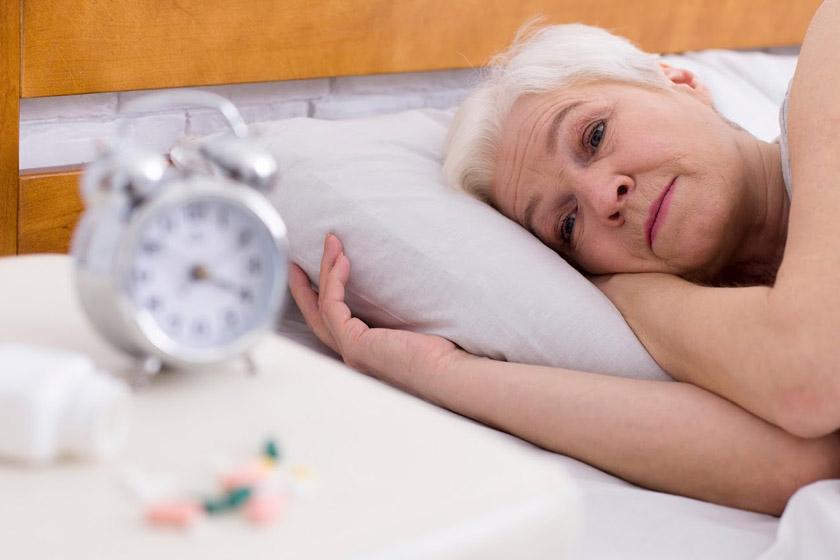
Sleep deprivation and poor quality sleep have numerous negative effects. It may be physiological, such as an increased risk for stroke, heart disease, and high blood pressure. The negative effects can also develop psychologically, such as increased irritability, anxiety or depression. The quality of your sleep can even impact your and others’ safety.
Insufficient sleep hygiene can lead to poor sleep quality. The following are other common factors:
Sleep disorders:
Sleep disorders such as insomnia can make falling or staying asleep difficult. In short, sleep quality can be affected by nighttime symptoms of narcolepsy, including nightmares and frequent arousals.
Sleeping environment:
Darkness and silence are essential in the bedroom. In the hours before bedtime, it’s best to avoid TVs, laptops, and phones that emit blue light, enhancing alertness.
Irregular sleep schedule:
Waking up and going to sleep at a specific time each day can facilitate better sleep.
Snoring:
Snoring can be normal to a certain degree, but excessive snoring can cause the sleeper to wake up or negatively affect their partner. Symptoms of obstructive sleep apnea (OSA) might include this kind of snoring.
Caffeine:
Caffeine disrupts sleep. One of the most apparent effects of a stimulant is making it difficult for you to fall asleep. In addition, caffeine can delay your body’s clock, according to study. As a result, you will sleep less. Caffeine can also interfere with deep sleep.
Alcohol:
Almost any level of alcohol consumption can disturb sleep and cause sleep disorders. Sleep state structure, duration, and sleep time are all affected by drinking alcohol.
Medicine:
Some prescription drugs increase the need to go to the bathroom during the night, waking users up. Make sure your doctor is aware of all the medications you are taking.
Psycho-physiological insomnia:
Being worried too much about not getting enough sleep and feeling tired the next day.
Mental illness:
People with insomnia are more likely to suffer from depression and anxiety disorders. In addition, these factors can cause racing thoughts or a lack of relaxation at night.
Experiencing body aches or other discomforts:
It is common for people to be kept awake at night by particular pains, such as joint pain or muscle pain. Falling asleep and staying asleep in this condition is difficult.
What Are the Benefits of Good Sleep for Seniors?
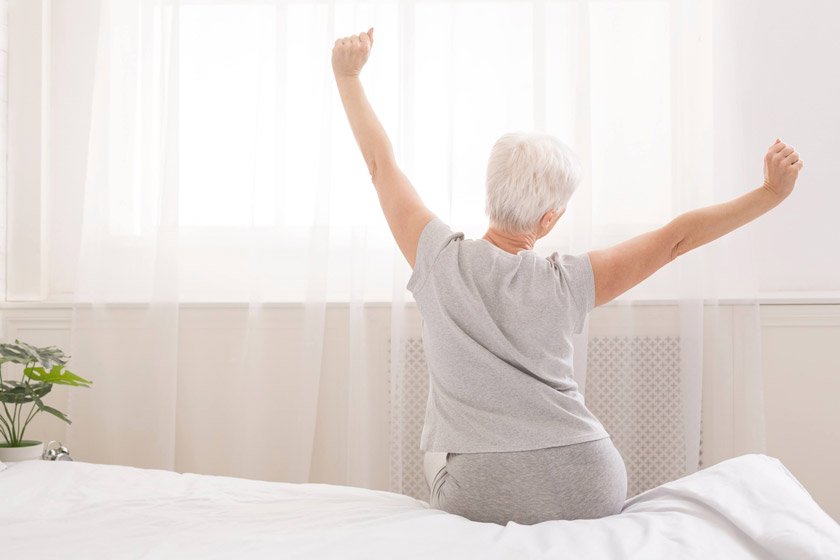
No matter how old you are, you require a good night’s sleep for a successful ageing process. In addition to improving your quality of life, well-regulated sleep routines have many other health benefits. According to NCBI (National Center for Biotechnology Information), sleep facilitates the brain’s ability to remain cognitively sharp by cleansing the brain’s tissue daily. Other health benefits of good sleep for seniors include:
- Alertness during the day.
- Improved memory and concentration.
- Decreased symptoms of depression.
- Improved cardiovascular health.
- Decreased medication use.
- Reduced stress and anxiety.
- A happier, more engaged lifestyle.
- Improved mood.
- Controlled appetite.
- healthy weight and BMI range for seniors.
- Less potential to fall.
How Can Seniors Improve Their Sleep Quality?
It’s crucial to figure out the reasons behind your sleep problems if you want to improve your sleep quality. Slow-wave sleep (an incredibly vital part of the sleep cycle) is likely to decrease as we age.
This issue causes us to have less melatonin, leading to more fragmented sleep and waking up at night more often. Consequently, as we age, many people consider themselves “light sleepers.”
Having these signs in your sleep pattern can be regarded as normal as you age:
- Sleeping earlier
- Waking up earlier
- Napping during the day
Major Sleep Disorders of Seniors
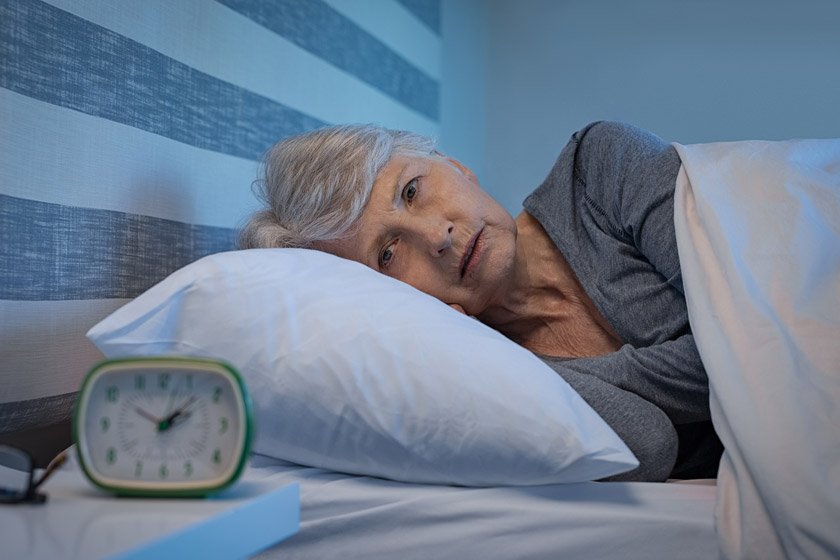
Sleep disorder causes disturbances in your sleep pattern or prevents you from getting restful sleep, resulting in daytime sleepiness and other symptoms. Sleep problems can happen to anyone at any time. Although, you might suffer from a sleeping disorder if:
Sleeping is difficult for you frequently.
Even though you slept for at least seven hours the night before, you may face fatigue in seniors during the day.
There is a reduction or impairment of your ability to perform regular daily activities.
Sleep disorders of the elderly can include:
Insomnia: Trouble dropping off to sleep, or trouble staying asleep.
Periodic limb movement disorder: (PLMD) is a medical condition in which a person’s legs and arms move at unreasonable and repetitive rates during sleep. A person may become sleep-deprived or sleepy during the day due to these episodes of limb movement.
Sleep apnea: this sleep disorder can be fatal; sleep apnea involves breaths that stop and start repeatedly. It’s possible that snoring loudly and feeling tired even after a whole night’s sleep are symptoms of sleep apnea.
REM behaviour disorder: A rapid eye movement (REM) sleep disorder characterized by acting out vivid, often unpleasant dreams, with vocal sounds and sudden and violent movements during REM sleep – sometimes referred to as dream-enacting.
Narcolepsy: A chronic neurological disorder affecting the brain’s sleep-wake cycle. After awakening, a person with narcolepsy may feel rested but feel sleepy for most of the next several hours. In addition to waking up frequently during the night, narcoleptics commonly suffer from interrupted and uneven sleep.
Tips for Sleeping Better as You Get Older
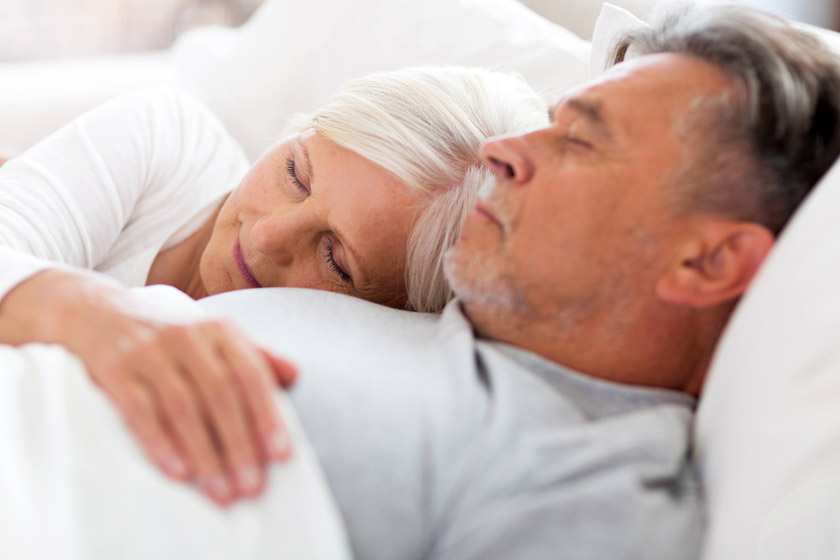
Here is a list of tips on how to get a good night’s rest for seniors:
- Make your bedroom a sleep zone by keeping it cool and quiet.
- Do not use the bedroom for anything other than sleeping and sex.
- Reduce snoring with nasal strips, nasal sprays, nasal humidifiers, positional devices, and even tongue exercises.
- Spend some time in the sunlight.
- Take a warm bath.
- Avoid nicotine, especially before bed.
- Don’t work out close to bedtime.
- Reduce your fluid intake at night.
- Move the bedroom clock out of sight.
- Avoid drinking alcohol before bedtime.
- Try foods such as yogurt or warm milk before bed.
- Don’t eat anything heavy or spicy before going to bed.
- Try deep breathing.
- Get the right mattress.
- Try warming your feet up by wearing bed socks.
If you still aren’t asleep after 20 minutes, move to another room, read, or do a relaxing activity like yoga for seniors.
Does Yoga Help Seniors Sleep?
Numerous studies demonstrate the benefits of yoga on sleep. Various studies have shown that yoga can help patients sleep better and benefit people of all ages. Yoga provides multiple health benefits, including better sleep, for children and the elderly. Daytime yoga practice can be any type that is comfortable for the user. Vinyasa and hot yoga are easy exercises for seniors better sleep. These two forms of yoga have a high level of activity. Several hours before you go to sleep, such exercise can help you sleep better. Slower and more restorative yoga such as Hatha and Nidra yoga is more suitable for those practicing yoga closer to bedtime.
Foods to Help Seniors Fall Sleep
You may sleep better or be sleepier if you consume certain foods. However, diet affects not just energy and sleepiness; it also affects weight, cardiovascular health, and blood sugar levels. Just remember, before making any significant dietary changes, it’s best to consult your doctor or dietician.
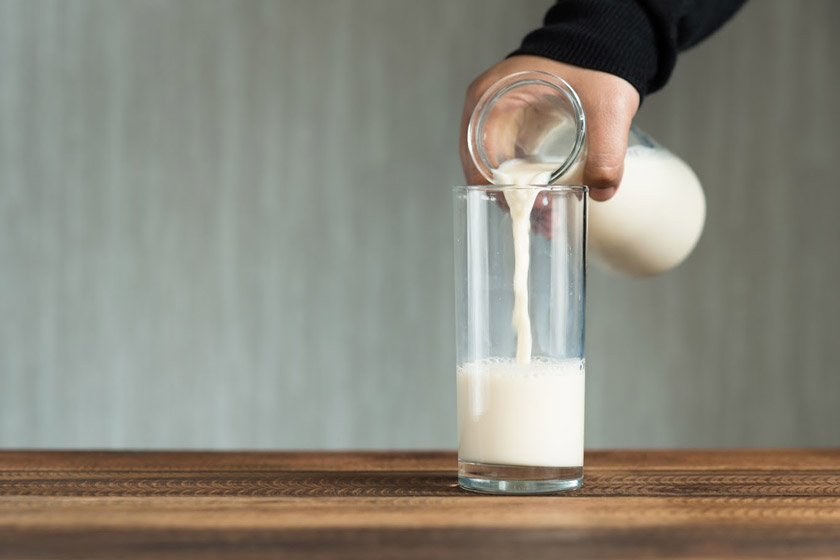
Milk and other dairy products: milk is among the foods to help seniors sleep. It contains melatonin, which regulates sleep and wakefulness.
Grapes: Grapes contain melatonin, which can help seniors sleep.
Nuts: Nuts like walnuts, almonds, pistachios, and cashews are sometimes considered good foods for sleeping.
Bananas: Several sleep-promoting nutrients are in bananas, including tryptophan, magnesium, potassium, vitamin B6, and carbs.
Fish: Omega 3 supplements may improve the quality and quantity of sleep in adults. Researchers have found that omega-3 fatty acids from fish can help enhance sleep quality, helo you fall asleep faster, and boost your performance at work.
Chamomile Tea: Besides the many health benefits of chamomile tea for seniors,
it can reduce your anxiety and make you feel sleepy.
What Are Sleep Deprivation Effects on Seniors?
Sleep deprivation is not a particular disease. Most often, it comes from other illnesses or circumstances in life. If you aren’t getting enough sleep, your body and brain can’t function properly, and your quality of life will dramatically reduce. Researchers found that too little sleep at night can increase the risk of early death. Sleep deprivation can affect seniors both physically and mentally.
Physical Effects of Sleep Deprivation on Seniors
Sleep deprivation in seniors can affect:
- Immune system: Sleep deprivation can affect your immune system. People who don’t get enough quality sleep are more likely to fall ill after being exposed to a virus, such as the common cold virus. Sleep deprivation can also affect how fast you recover if you become sick.
Digestive system: Many have studied the effects of sleep on weight management. Sleep deprivation throws your hormones out of balance and makes you crave high-GI foods, sugar, and fat.
Sleep deprivation and risk of type 2 diabetes: The body’s ability to handle glucose is also lowered by sleep deprivation, contributing to insulin resistance. Obesity and diabetes in seniors may result from such disruptions. In those aged 40 years or younger with insomnia, Type 2 diabetes is higher than in older adults.Cardiovascular system: You can also be at risk for stroke if you get little sleep.
Breathing and respiratory diseases: If you wake up frequently during the night, you risk sleep deprivation, which leaves you more vulnerable to respiratory infections. Chronic lung disease, for example, can be made worse by lack of sleep.
Sleep Deprivation and Senior’s Mental Health
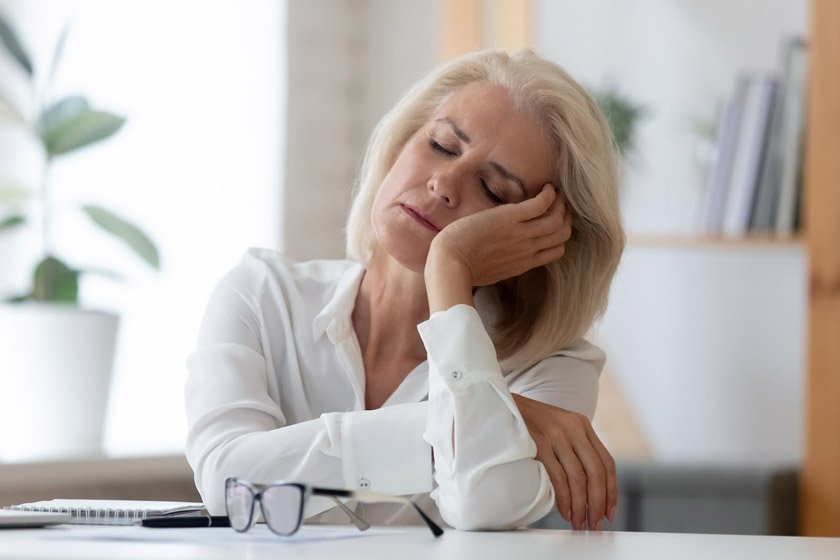
Sleep deprivation can affect the central nervous system, and information travels mainly through your central nervous system. Mental and emotional health is also negatively affected by sleep deprivation.
Along with:
Decision making: Sleep deprivation can affect the process of making decisions.
Mood swings: An increase in impatience or mood swings may occur.
Depression: Lack of sleep contributes to depression.
Anxiety: Sleep problems are frequently related to stress. Sleeping through the night becomes problematic when there is excessive worry and fear.
What Is the Difference Between Sleep Deprivation and Insomnia?
Insomnia is the inability to sleep sufficiently, in either length or quality, regardless of the presence of opportunities for sleep. On the other hand, sleep deprivation is when someone cannot sleep due to an external restriction.
Final Words
Exhaustion and lack of energy are not the inevitable part of aging, do not stand for it and do not listen to people who advertise such beliefs.
By improving your sleep and finding the root of your issues, you can have a healthier lifestyle. Consult your doctor and take the best possible care of yourself.
Since I can remember, I’ve always had trouble falling asleep. Even when I was a teenager, I couldn’t fall asleep in unfamiliar places. That was ok back then. I used to sleep about three or four hours when I was camping, and the next day I would be so energetic. But now, it’s not that simple; every time I have a doctor’s appointment or a casual meeting, I can’t fall asleep. Reading helps a lot. I read random chapters of my favourite novels. My last help resource is eating garlic; I sleep like a baby after eating garlic.
I’ve had difficulty falling asleep for a while now. Even if my days were pretty uneventful, I would still be drowning in thoughts all night. Luckily, I’m better now. But when you can’t fall asleep, you cannot function properly the next day, and as a result, daily life gets really hard, sometimes even unbearable.
All my life, I’d had a problem with sleeping until I went to my therapist. When I was younger, I suffered from overthinking, and I think that was the main cause of my insomnia. My therapist told me the root of my chronic insomnia had been a kind of OCD (obsessive-compulsive disorder). He recommended doing some specific before sleep practices and prescribed some medicines. Now I’ve got significantly better and have less struggle to fall asleep.
Oh, I cannot begin to tell you how much of a painful procedure it is for me to sleep. I keep waking up for no reason, and My sleeping pattern is very messed up. Normally I wake up 4 to 5 times every night. I miss the days I could get a good sleep.
I’m glad I’ve never had that much trouble with sleeping, even though I am 60 years old. I don’t know if it is because I drink a cup of warm milk every night before going to bed or exercising throughout the day. Whatever it is, it feels good to sleep without any problem every night.
Wow, this was fairly comprehensive. Thank you. I don’t really have a serious sleeping problem, but for some reason, there have been a lot of times when I woke up after a good amount of night sleep and still felt tired. I hope these practices prove effective.
I don’t have acute sleep disorders and merely experience sleepness. Once I was hit by sleeplessness, I examined chamomile tea, and it worked for me. It was great, and after drinking, I got asleep. If you don’t have an acute sleep disorder or insomnia, chamomile tea will be great for you.
I do agree with all the concepts you have offered in your post. They are really convincing and will definitely work. Thank you for the post.